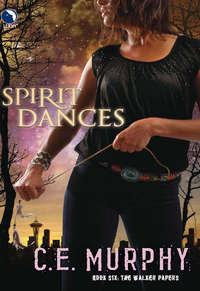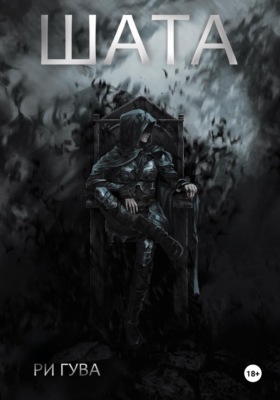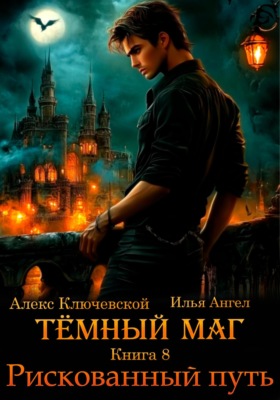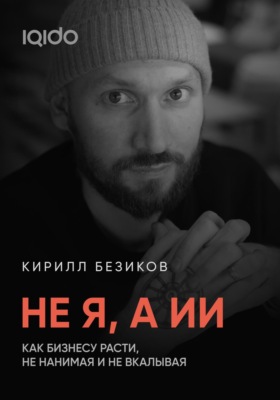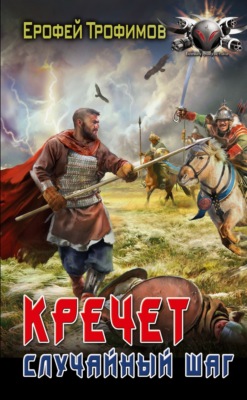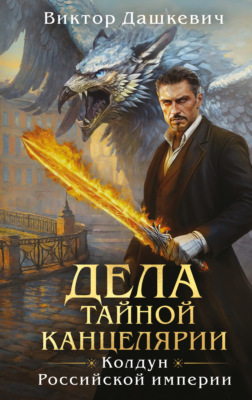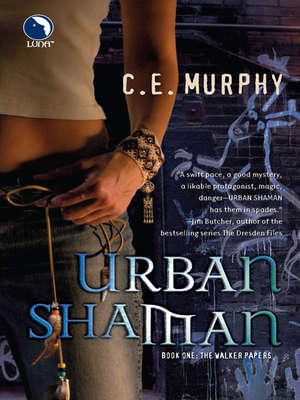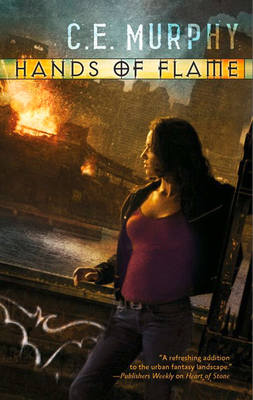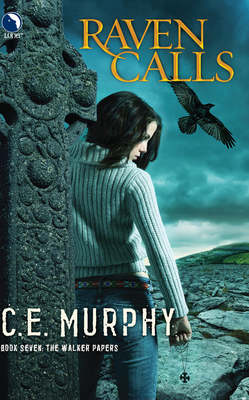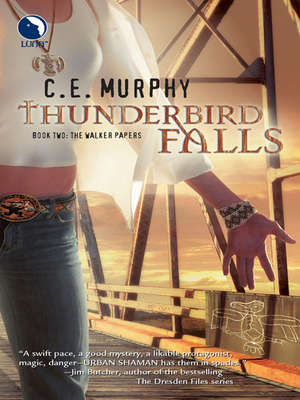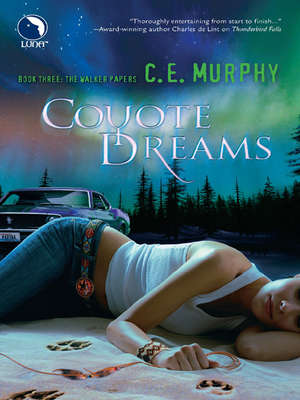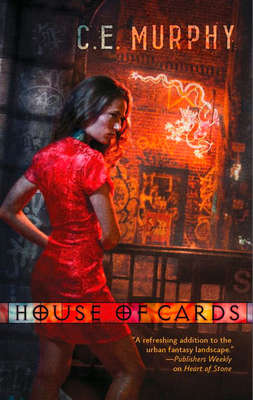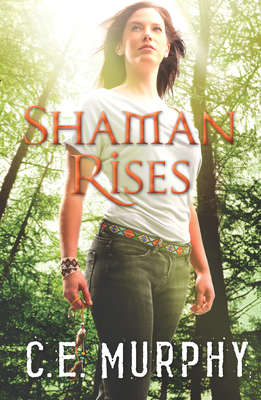Loe raamatut: «Spirit Dances»
Praise for
C.E. MURPHY
and The Walker Papers series:
Urban Shaman
“A swift pace, a good mystery, a likeable protagonist,
magic, danger—Urban Shaman has them in spades.”
—Jim Butcher, bestselling author of The Dresden Files series
Thunderbird Falls
“Fans of Jim Butcher’s Dresden Files novels and the works
of urban fantasists Charles de Lint and Tanya Huff should
enjoy this fantasy/mystery’s cosmic elements. A good choice.”
—Library Journal
Coyote Dreams
“Tightly written and paced, [Coyote Dreams] has a
compelling, interesting protagonist, whose struggles and
successes will captivate new and old readers alike.”
—RT Book Reviews
Walking Dead
“Murphy’s fourth Walker Papers offering is another gripping,
well-written tale of what must be the world’s most reluctant—
and stubborn—shaman.”
—RT Book Reviews
Demon Hunts
“Murphy carefully crafts her scenes and I felt every gust of wind
through the crispy frosted trees…. I am heartily looking forward
to further volumes.”
—The Discriminating Fangirl
Spirit Dances
Book Six: The Walker Papers
C. E. Murphy

This one is for Matrice,
who has been waiting for it for a long, long time :)
CONTENTS
CHAPTER ONE
CHAPTER TWO
CHAPTER THREE
CHAPTER FOUR
CHAPTER FIVE
CHAPTER SIX
CHAPTER SEVEN
CHAPTER EIGHT
CHAPTER NINE
CHAPTER TEN
CHAPTER ELEVEN
CHAPTER TWELVE
CHAPTER THIRTEEN
CHAPTER FOURTEEN
CHAPTER FIFTEEN
CHAPTER SIXTEEN
CHAPTER SEVENTEEN
CHAPTER EIGHTEEN
CHAPTER NINETEEN
CHAPTER TWENTY
CHAPTER TWENTY-ONE
CHAPTER TWENTY-TWO
CHAPTER TWENTY-THREE
CHAPTER TWENTY-FOUR
CHAPTER TWENTY-FIVE
CHAPTER TWENTY-SIX
CHAPTER TWENTY-SEVEN
CHAPTER TWENTY-EIGHT
CHAPTER TWENTY-NINE
CHAPTER THIRTY
CHAPTER THIRTY-ONE
ACKNOWLEDGMENTS
CHAPTER ONE
FRIDAY, MARCH 17, 8:34 A.M.
“Walker, Holliday, you’re up. Homicide in Ballard, probably domestic violence. Be there yesterday.” A set of sedan keys flew across the room at my head. I caught them painlessly, only because I’d just come in the door and hadn’t yet taken my gloves off. The guy who’d thrown them at me—our lieutenant, Braxton, who was decent, hardworking, and who never impinged on my consciousness for a single moment beyond those I spent following his direct commands—jerked his jaw at the door, indicating we should already be gone. I did a quick dance of shedding my coat, shrugging on my duty weapon—an item which, like Braxton, lay outside my realm of active awareness except when I was actually at work—and pulling the coat back on before my partner made it to the door.
Because my desk was three steps from the door, I got there first, and that meant I won: I got to drive. After nine months of that game, I wasn’t sure why we bothered, be cause neither of us pretended Billy was the better driver. Not that he was a bad driver, mind you. It’s just that it was the only class at the academy I’d been too proud to come in anything but first.
He caught up to me and muttered, “I hate domestic cases,” as we headed out the door.
“I know.” Nobody liked them, which was part of why Billy and I were up on this one. Braxton tried to rotate the DV cases through the whole Homicide team, because under the best of circumstances, they were emotionally messy, and under the worst—which was more usual—cops ended up the bad guys no matter what they did. “Could be worse. At least a murder means there won’t be an outraged spouse trying to beat us off because her partner didn’t really do anything wrong.”
“Walker, are you seriously telling me murder is preferable to a live victim who doesn’t want to press charges?”
“That wasn’t what I meant.” It was, however, kind of what I’d said. No wonder I let Billy do most of the talking at crime scenes. We drove over to Ballard while Dispatch offered a few more details on the homicide we were approaching. There was a pattern of abuse in the family, instigated by the wife, one Patricia “Patty” Raleigh, against whom the city had twice pressed charges. She’d done anger management courses and then a short stint in jail. We weren’t sure yet if it was herself or her husband, Nathan, or possibly both, who was the victim: one of their children had run out of the house, bloody and screaming hysterically about Mommy and Daddy being dead. The neighbor had called it in.
Billy left his coffee untouched as the information came in, muscle in his jaw bulging like flexible stone. “I hate domestic cases.”
“I know.” There was nothing else to say. I pulled up along the curb in front of the Raleighs’ ranch-style home a few minutes later, and we got out of the car. It wasn’t a wealthy part of the city, the houses mostly from the fifties and sixties. They tended to look careworn, with sagging fences, older tricycles and swing sets in small front yards. A few houses stood out as having been renovated: fresh paint, new roofs, lawns trim and shipshape even though winter was only just letting go its grip.
The Raleighs’ house wasn’t one of those. I glanced over it, then met the eyes of a broad-boned black woman standing in the next yard over. She had two kids with her, both white, both huddled against her strong form. Her hands were on their chests, over their hearts: protective, like a mama bear. She was probably the neighbor who’d called in the 273D, and the kids were probably Nathan and Patty Raleigh’s. I nodded to her once and she nodded back, then retreated to her front porch, taking the kids with her. She’d been letting us know where they were, and now planned to stay out of the way until we needed them and her. Most people intimately involved with a murder weren’t that clearheaded. I chalked it up to equal likelihoods that she was involved or that she was very sensible, and followed Billy up the driveway to the house.
He paused at the door, an eyebrow lifted at me. I gave him a nod much like I’d just given the neighbor, then let the Sight filter over my normal vision.
Truth was, though normal investigative homicides like this one made up the bulk of our work, Billy and I weren’t partnered because we were good at solving run-of-the-mill cases. We were partners because he saw dead people and I was a shaman. A healer, basically, though I had a wider range of talents than that. Together we made up Seattle’s one and only paranormal detective team, and even on a mundane case, there was no reason to let our esoteric skills go to waste.
The world viewed with the Sight was something of a wonder to behold. Everything shone with purpose, rich aura colors making light of the most ordinary objects. Newly budding leaves on trees thrummed with brilliant blue-green threads that would become bluer as they grew, until they were vibrant with life pouring through them. Houses, buildings and fences tended to radiate a resolute green, a pride in protecting the things they held. Everything, living or in animate, had purpose, and I could See that purpose when I looked with shamanic eyes.
I could also See people’s auras, even through walls, which was unusually handy in clearing a house for entry. There was nothing living inside the Raleighs’ house, though a bright orange shimmer said a housecat was probably in the back yard hunting early-season bugs. A crawl space beneath the house would’ve been a better choice for the cat: plastic tarp down there kept the earth warm and I could See the squirms of potato bugs and other such small things doing whatever it was bugs did. The attic was quieter than that, not so much as a squirrel hiding out. I nodded to give Billy the all-clear.
He knocked anyway, as was polite, and introduced us loudly before trying the doorknob. It turned, to neither of our surprise: if the kids had come running out, they weren’t very likely to have stopped and locked the door behind them. And an inSightful all-clear or not, we both went in like we were entering hostile territory, because God forbid I should be wrong and we should fail to follow protocol. Our boss—Morrison, the precinct captain, not Baxter-the-forgettable—would rip us apart if we did.
Nathan Raleigh was just inside the door, a late, macabre addition to an otherwise low-key, attractive living room. He hadn’t been dead all that long. His color was still fading, but there was a remarkable amount of blood soaking into the pale blue carpet. Billy and I exchanged glances, then Billy tipped his head to the left, indicating he’d check out the room through the next doorway, barely two steps away. I nodded and edged forward just far enough to keep an eye on him. There was a short hallway in front of us, down which I guessed were bedrooms, which I couldn’t let go uncovered while he checked out the open-plan kitchen and second living room to our left.
He said, “Clear,” after a few seconds. “Doorway to my right.”
“One to my left here, too.” We knocked our respective doors open, winding up on opposite ends of a T-shaped bathroom, guns pointed at each other. Billy crooked a faint grin, then stepped into the top of the T, putting himself exactly opposite me.
A short brunette woman came through the door behind him, a nail-spiked baseball bat already descending toward his skull.
I shot her.
CHAPTER TWO
Time slowed down in crises, for me. I wasn’t sure it was possible to drop into actual bullet-time, like in The Matrix, but I swore I saw the bullet’s spin and the percussion blast as it slammed into Patricia Raleigh’s right shoulder. Blood misted out. She screamed. The bat’s downward momentum was knocked far enough askew to no longer threaten Billy. He hit the deck anyway, flipping on his back to bring his weapon up defensively, finger still on the trigger-guard.
Mine was still squeezing the trigger. My throat hurt, though I couldn’t remember yelling. I knew I should have. Drop your weapon! or Police! or something like that. Maybe I’d said both. In protocol terms, it mattered. It mattered very much. In real-world terms, it mattered a lot less: my partner had been under attack, and shouting was never going to stop the bat from bashing into him. One shot, a good one, had been enough. Good thing, too. I’d never shot another human being before. I wasn’t sure I could do it again, even for a double-tap to make certain Billy would remain safe.
Patty Raleigh staggered a few steps backward and fell over.
My belly erupted with pain, diamond claws digging in and hauling my insides apart as the core of my magic went to war with what I’d just done. I dropped my gun and limped forward, one arm curled over my stomach. I paused next to Billy, who hadn’t yet moved, cords standing out in his neck and breath coming hard. He jerked his gaze to me, then nodded, one sharp movement to say he was okay. Nausea that I interpreted as relief swept through the pain in my gut, and I kicked Patty Raleigh’s baseball bat—it was already bloodied, the nail thick with matter I didn’t want to examine—farther away before kneeling at her side.
There was no exit wound spilling blood onto her pale blue carpet, which meant the bullet had lodged in her right clavicle. A very good shot, then, because the impact and lodgment would have knocked her farther off balance than a clear shot through the muscle would have. In terms of preventing a nail from taking up residence in Billy’s head, I couldn’t have done better without killing her.
Which I hadn’t. She was still breathing, though the inhalations were shallow and shocky, and her eyes were glazed with pain. The wound technically wasn’t life-threatening, but that made less difference than people thought, with shooting victims. Shock or sepsis did them in. The human body was not meant to stop small metal objects traveling at 850 feet per second, and tended to react poorly. Patty Raleigh might very well die with me kneeling beside her.
Of course, I could prevent that from happening. Or at least, I could in theory prevent it. My stomach was still a mass of twisting pain, every bit of magic I’d ever commanded turning black and red with its own kind of septic shock. My fingers were too thick to bend, my hands frozen and stiff. I put one on Raleigh’s shoulder and applied pressure, disquieted at the heat of her blood. She gurgled, more disturbing than a scream, and I thought if anything should unlock the healing magic I carried within me, it should be that sound.
Nothing happened, not a rush of instantaneous healing, not even the far more familiar layered vehicle body work that I’d used as my healing imagery for most of a year. I was no more use than any ordinary person, putting pressure on a bleeding wound. “Billy.”
He started talking as I said his name, calling in the shooting, requesting an ambulance, requesting backup: all the things I’d been going to ask him to do. Intellectually I knew he was on the ball, that it had been barely ten seconds since Patricia Raleigh had swung the bat at his head, but I felt encased in ice, like everything was still happening at a glacial pace. Shock, just like Raleigh was in.
Billy said, “Don’t move,” to me, and went to clear the rest of the house. I should have thought of that. I should have thought of a lot, except I couldn’t think of what else I might have done. Patty hadn’t been in the house—hadn’t been on the property—when I’d examined it psychically. Either that or she could batten down her aura like nobody I’d ever met, but I really didn’t think so.
There was an open sliding glass door beside us, making up the back wall of the living room. She’d clearly come through it, but where she’d been before that, I had no idea. The cat I’d Seen was still pouncing around the backyard, intent on capturing a moth.
“Clear.” Billy came back from the bedrooms and crouched beside me, face grim with concern. “You okay, Walker?”
“Yes. No. I can’t heal her.”
To my utter surprise, he touched my right cheek. I had a scar there, thin and mostly invisible, a remnant and reminder of the day my shamanic powers had exploded to life. “You couldn’t heal this, either. Some things aren’t meant to be fixed.”
“But I did this.” My belly cramped again and the words came out tiny and painful.
“Maybe that’s why you can’t undo it. The paramedics will be here in a few minutes.” He was silent a few seconds, then put his hand on my shoulder, squeezing. “You saved my life.”
I wanted to make a joke. Just a small one, something about I had to or your wife would kill me, but I couldn’t. I couldn’t at all. I only nodded, a jerky little motion like he’d given me a minute earlier. He offered a heartbreaking smile in return, like he understood exactly what I couldn’t say. “Keep pressure on that wound until the ambulance arrives.”
It was a very sensible order. It made me feel like I was accomplishing something, when we both knew the truth was I couldn’t have moved if I’d wanted to. If I’d had to, yeah, probably. But short of somebody else coming out of the woodwork to kill Billy, no, I was stuck there on my knees next to Patricia Raleigh for the interim. I nodded again, and Billy went to the front door to await an onslaught of cops, paramedics, forensic examiners and, inevitably, Michael Morrison, captain of the Seattle Police Department’s North Precinct, and our boss.
I was sitting on the front steps, holding gun and badge loosely in my hands, when he came up the driveway. Any cop involved in a shooting had an automatic three-day suspension, so Morrison didn’t have to ask: I just handed the weapon and badge over. Patty Raleigh’s blood was under my fingernails, and Morrison noticed it as he accepted them. He checked the chamber and magazine—I’d already unloaded it—then tucked the gun into an empty holster under his suit jacket before asking, “What happened?”
I knew I should probably stand up and make a brisk report, but instead I stayed seated and outlined the incident in as few words as possible, mostly staring at Morrison’s belt while I did so. “Paramedics took Raleigh away about three minutes ago. She’ll probably live. Billy’s, uh. He’s inside, heading up the investigation on Nathan Raleigh. He thought it was better if I…”
Morrison nodded, only partially visible from my viewpoint angle. Then he sat down beside me, wooden porch creaking with his weight. “So what happened?”
I looked sideways at him. He wasn’t looking at me, gaze focused on the fence or the street beyond it, but he didn’t have to be looking my way for me to feel the weight of his concern or his determination to get an answer. I put my hands over my face, realized they smelled like blood, and dropped them again to stare at the street just like Morrison was doing. “I couldn’t heal her. I couldn’t…”
“I’ve seen you use shields to protect people. Why didn’t you stop her that way? Put one up around Holliday?”
Christ. Morrison, who liked magic even less than I did, would still be a better practitioner than I was. “I didn’t think of it. This wasn’t a paranormal case. It was a domestic homicide. I don’t usually bring the whole shooting match to the day job. She was there, she had a weapon, I had a weapon, I shot her. And now my gut feels like I ate a box of fishhooks and the healing won’t respond. And if I was anybody else you wouldn’t be wondering why I used my Glock .40 instead of magic.”
“That’s true. But you’re not anybody else.” Morrison exhaled, and I dropped my head again, though I kept my fingers laced together in front of my knees, not wanting to breathe in the scent of blood a second time. He was right. I wasn’t certain he was unconditionally right, but the power within me had always put forth some pretty clear ideas on what I should and shouldn’t do. The wrenching pain in my stomach and the lack of response from the magic both told me flat-out I’d chosen poorly.
“I’m supposed to be on a warrior’s path, you know that?” I asked the stairs beneath my feet. Morrison didn’t know, because I’d never discussed it with him. I didn’t discuss it with many people, much less the boss with whom I had, until quite recently, had a distinctly antagonistic relationship. “That’s what I was told right when all this started. That I was a healer on a warrior’s path. That I was going to have to fight to make things right. But there’s no memo. There’s no handbook saying ‘these are the circumstances you get to fight in.’ Instead what happens is something like today. Or back with the goddamned zombies. God, I hate zombies. Anyway, I always find out the hard way that I can’t use the magic offensively or it craps out on me. Now it turns out if I use ordinary real-world physical force on ordinary real-world people, I get bit in the ass for that, too. I know you don’t think I’m the greatest cop in the world, but I followed protocol. I did the right thing in police terms to protect my partner. Didn’t I?”
My voice got small as I recognized there were probably a million people it’d be better to say this to than Morrison. Unlucky for him, he was the one who’d asked what had happened, and unlike the psychologist I knew I’d have to talk to later, he was aware of and believed in—however reluctantly—the occult side of my life.
“There’ll be an investigation before I can properly answer that, Walker,” he said with unusual gentleness. I put my face in my hands again after all, holding my breath to avoid the smell of blood, and startled when he touched my shoulder. “But yes, it sounds like you did.” His voice went wry. “And no one else will be asking why you didn’t use a magic shield instead of a gun. I just wondered.”
“I don’t know if I’m ever going to think of the magic first, Morrison. Most cases don’t need it. I’m…” I trailed off with no real idea of what I wanted to say, and Morrison got to his feet.
“You’re officially suspended from duty pending an investigation into this shooting, Walker. A minimum of three days. Thanks for not making that difficult. You have an appointment with the psychologist at one. Get somebody to bring you back to the precinct building and get cleaned up. I want to see you when you’re done talking with her.”
I whispered, “Yes, sir,” and went to do as I was told.
Being suspended from duty for three days almost certainly meant “go home once you’re cleaned up,” but although I only lived a few miles from the precinct building, back-and-forthing seemed like a waste of time. I had clothes at work—the blue polyester pants and button-down shirt that were ubiquitous to police officers everywhere—so I showered, put them on and went back to my desk in Homicide. There was paperwork to do, not just for the morning: there was always paperwork to catch up on. It was a damned sight better to work than sit at home and brood. One of the other detectives came by to offer me a green armband, which was his way of offering sympathy for the morning’s incident without making a fuss about it. I put the armband on, glad not to have gotten pinched, and spent the next three hours writing reports, filling out forms and trying hard not to think about Patricia Raleigh’s glassy stare and short, shallow breaths. Mostly it worked, except when I had to write the actual incident report, and then I sat there a long time, wondering why I hadn’t responded the way Morrison suggested I should have.
Well, no. Not really wondering. I’d gone to the police academy, and though there’d been three solid years of working for the department as a mechanic before I became a cop, at the end of the day, I’d been trained to react the way I had. A couple of times during the academy I’d awakened from dreams I didn’t remember, kneeling in the middle of my bed in a firing position. That kind of training became hardwiring, and nothing I’d done in the past fifteen months had driven magic-using responses that deep into my brain. There was, as far as I knew, no such thing as shamanic boot camp, much as I could use it.
Knives prickled at my gut again, suggesting that I really could use a shamanic boot camp, or something else that forced me to react with magic first and brute force later. Either that or it was sheer nervousness, as it was a few minutes to one and I had an appointment with a shrink. I abandoned my desk and went upstairs to her office, heart hammering and hands cold for the second time that day. I’d met the psychologist, talked with her a few times, but never officially, and for some reason it was terrifying.
She took one look at my expression when I came in and said, “Don’t worry, everybody feels that way the first time. I promise it won’t hurt a bit. Louise Caldwell, not that you don’t know that.” She offered a hand, I shook it, and we both sat down as she asked, “How’re you doing?”
“Been better.” A shrink probably expected a deeper, more profound answer than that. I held my breath, sought something more profound and came up with the same thing again, this time as a shaky laugh on an exhalation: “Yeah. Been better.”
“Good,” she said crisply. “You’d be surprised how many people walk through that door after shooting someone and say they’re just fine. Did you have a choice?”
I blinked, taken aback at the no-nonsense approach. I thought psychologists were supposed to pussyfoot around things. Not that Dr. Caldwell looked like the pussyfooting sort: she was in her late forties, gray streaks at her temples probably indicative of carefully dyed hair, and dressed in a well-tailored suit that gave an impression of seriousness. I cleared my throat, wondered if that came across as hesitating and shook my head. “I really don’t think so. There was no warning. Detective Holliday stepped into the bathroom and she was behind him, already swinging the bat. If I hadn’t reacted immediately he would be badly injured, maybe dead.”
“And how do you feel about that?”
“I’d sure as hell rather have shot her than have Billy be in the hospital! Especially since she’s not dead.” I cleared my throat again, pretty certain that was entirely the wrong thing to say, but faint humor flickered across Dr. Caldwell’s face.
“That’s a comparatively healthy attitude, Detective. It’s easy, in a bad situation, to accept only blame instead of seeing the other potential side of the scenario. As you say, she isn’t dead. Was that a deliberate choice?”
“No. It was just the clearest shot I had, her right shoulder. Billy dropped, but I didn’t double-tap. That…that was deliberate. Kind of. I don’t know if I could’ve shot a second time.” I looked away from her, focusing on one of half a dozen framed certificates on the wall, and much more quietly said, “I could have if she’d kept coming. I would have. I don’t think I knew that until right now.”
My stomach twisted again, glass shards jabbing at me, but somehow the knowledge made me feel better in a completely screwed-up way. Police officers almost never had to shoot anyone in the line of duty even once, much less twice, but I was darkly certain I could do it again if I had to. I didn’t want to, but there was probably something wrong with somebody who wanted to go around shooting people. I relaxed a little and Caldwell saw it, but apparently it was okay. She kept me there for over an hour, asking questions that eventually had me weary to the bone, but I walked out feeling like I hadn’t completely fucked up, either at the scene that morning or there in her office. I had no idea what she would tell Morrison, but I was too tired to worry about it.
I went by his office as instructed, but he wasn’t there. I dropped off my incident report, then went back upstairs to Homicide to collect my coat. At some point “suspended from duty” had to mean “go home,” and I was emotionally wrung out enough to decide that point was now. Morrison could kill me for disobeying the come-see-me order later, after I’d napped. Coat in hand, I waved a short goodbye to the rest of the team and headed for the door.
It cracked open before I got there, revealing a sliver of a woman in her fifties. She had an exceedingly mild blue gaze and short hair that had at one time been blond, but had since gone dirty yellow. She was dressed eclectically in a long skirt, a wool overcoat with a reflective vest over it and combat boots. There was a sparkly green shamrock pinned to the vest. On someone else, the whole outfit could’ve been deliberate eccentricity. On her it looked like the Army-Navy surplus store.
I fumbled to make sure my own green armband was in place as I tugged the door all the way open. “Oh, hi, sorry, come on in. I’m Detective Walker. Can I help you?”
“Detective Joanne Walker?”
I looked over my shoulder like I expected another Detective Joanne Walker to have appeared, then shook myself and looked back. “That’s me. Can I help you?”
A smile rushed across her face and took ten years off her age. “My name is Rita Wagner. You saved my life.”
